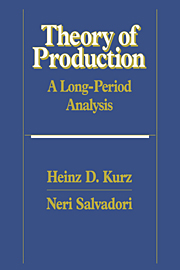Book contents
- Frontmatter
- Contents
- Preface
- A reader's guide
- 1 Free competition and long-period positions
- 2 A one-commodity model
- 3 Two-commodity models
- 4 Models with any number of commodities
- 5 Choice of technique
- 6 Alternative descriptions of a technique
- 7 Fixed capital
- 8 Joint production
- 9 Jointly utilized machines
- 10 Land
- 11 Persistent wage and profit rate differentials
- 12 On limits to the long-period method
- 13 Production as a circular flow and the concept of surplus
- 14 The neoclassical theory of distribution and the problem of capital
- 15 On some alternative theories of distribution
- Mathematical appendix
- References
- Name index
- Subject index
3 - Two-commodity models
Published online by Cambridge University Press: 06 January 2010
- Frontmatter
- Contents
- Preface
- A reader's guide
- 1 Free competition and long-period positions
- 2 A one-commodity model
- 3 Two-commodity models
- 4 Models with any number of commodities
- 5 Choice of technique
- 6 Alternative descriptions of a technique
- 7 Fixed capital
- 8 Joint production
- 9 Jointly utilized machines
- 10 Land
- 11 Persistent wage and profit rate differentials
- 12 On limits to the long-period method
- 13 Production as a circular flow and the concept of surplus
- 14 The neoclassical theory of distribution and the problem of capital
- 15 On some alternative theories of distribution
- Mathematical appendix
- References
- Name index
- Subject index
Summary
In this chapter, we will discuss models of economies in which it is assumed that two commodities are produced. The present chapter can thus be seen as an introduction to Chapters 4, 5, and 6 which deal with the general case of an economy producing n commodities.
A complete discussion of all possibilities of the two-sectoral case will be provided, subject to the following two assumptions: (i) the production of any commodity requires some material input(s); (ii) the two-commodity economy cannot be represented as if it consisted of two separate economies, each producing and using just one of the two commodities. The purely theoretical cases in which any of the two assumptions is violated are without any interest. A violation of assumption (i) would imply that some commodity is produced by labor only. If assumption (ii) were to be violated, this case could be interpreted as two economies which are technically completely disconnected. Most of the analysis in this book is carried out in terms of these two fundamental premises.
In Section 1 a first simple case will be discussed, in which both corn and silk are produced by means of corn, while silk is not used as a means of production, hereafter called the corn–silk model. Section 2 will analyze a case in which both corn and iron are produced either directly or indirectly by means of corn and iron, that is, the roles of the two commodities in production are symmetrical (corn–iron model).
- Type
- Chapter
- Information
- Theory of ProductionA Long-Period Analysis, pp. 58 - 93Publisher: Cambridge University PressPrint publication year: 1995



